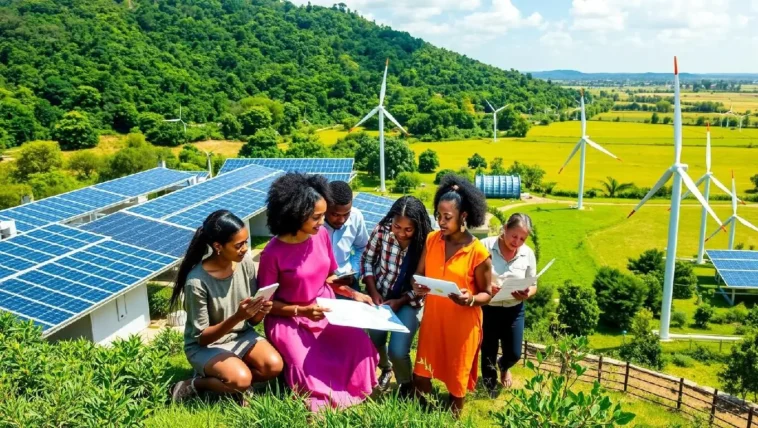Nigeria Renewable Energy University
Nigeria’s Green Revolution: First Renewable Energy University Launched!
Nigeria Renewable Energy University is set to revolutionize Africa’s energy sector by fostering innovation and creating highly skilled professionals.Powering the Future: Nigeria Embarks on a Bold Green University Vision
Nigeria is taking a monumental leap towards a sustainable future with its ambitious plan to establish the country’s first Renewable Energy University (REU). This initiative, poised to be a game-changer for Africa’s energy landscape, aims to cultivate a new generation of experts, innovators, and leaders in the renewable energy sector. Imagine a campus where the sun, wind, and earth are not just subjects of study, but also the very sources of its power. This is the vision Nigeria is chasing – a “green university” that embodies the principles of sustainability in every facet of its operation.
The REU isn’t just about erecting buildings and planting trees; it’s about fundamentally reshaping Nigeria’s approach to energy. It’s about creating a hub of knowledge and innovation that can drive the nation – and the continent – towards a cleaner, more secure energy future. With the support of key development partners, Nigeria is setting the stage to become a leader in renewable energy education and technology.
But what makes this university so crucial? In a world grappling with climate change and the urgent need to transition away from fossil fuels, the demand for skilled professionals in renewable energy is skyrocketing. Nigeria, with its abundant solar, wind, and hydro resources, has the potential to become a renewable energy powerhouse. However, realizing this potential requires a workforce equipped with the knowledge and skills to develop, deploy, and maintain these technologies.
The Renewable Energy University aims to fill this critical gap, providing specialized education and training that will empower Nigerian youth to seize the opportunities of the green economy. This is more than just an academic exercise; it’s an investment in Nigeria’s future prosperity and environmental sustainability.
From Roundtable to Reality: The Genesis of the REU Initiative
The seeds of the Renewable Energy University were sown at a roundtable meeting in April 2025, where Abba Aliyu, the dynamic Managing Director and CEO of the Rural Electrification Agency (REA), publicly unveiled the initiative. This wasn’t just a spur-of-the-moment announcement; it was the culmination of months of planning and collaboration with key stakeholders, including the Lagos State Government.
Aliyu’s vision was clear: to create a world-class institution that would not only educate students but also drive innovation and research in renewable energy. He emphasized the importance of partnering with state governments, academic institutions, and development partners to ensure the university’s success. The roundtable served as a platform to gather input, address concerns, and build consensus around the REU initiative.
The involvement of the Lagos State Government was particularly significant, as the state emerged as a strong contender to host the university. Deputy Governor Dr. Obafemi Hamzat expressed the state’s enthusiasm for the project, highlighting its potential to create jobs, attract investment, and enhance Lagos’s reputation as a hub of innovation. However, he also emphasized that Lagos would need to meet certain requirements to secure the hosting rights.
The genesis of the REU initiative underscores the importance of collaboration and stakeholder engagement in driving sustainable development. It’s a testament to the power of bringing together diverse perspectives and expertise to create a shared vision for the future.
Lagos vs. The Rest: The Battle for Nigeria’s Green University
The question on everyone’s mind: Where will Nigeria’s groundbreaking Renewable Energy University ultimately take root? While several states have expressed interest, Lagos State has emerged as a frontrunner, thanks to its strategic location, robust infrastructure, and commitment to renewable energy. However, the race is far from over, and other states are vying for the opportunity to host this prestigious institution.
What makes Lagos so attractive? Its status as Nigeria’s economic capital, its proximity to major industries and research institutions, and its vibrant ecosystem of entrepreneurs and innovators all contribute to its appeal. Moreover, the Lagos State Government has demonstrated a strong commitment to renewable energy, implementing various initiatives to promote solar power, energy efficiency, and waste-to-energy projects.
But hosting the REU is not just about prestige; it’s about meeting specific requirements. The university needs a suitable location with ample space for classrooms, laboratories, research facilities, and student accommodation. It also needs reliable infrastructure, including electricity, water, and internet connectivity. And perhaps most importantly, it needs a supportive environment that fosters innovation and collaboration.
The final decision on the university’s location will likely depend on a careful assessment of these factors, as well as the state government’s willingness to invest in the project. Regardless of where it ends up, the Renewable Energy University promises to be a catalyst for green growth and sustainable development in Nigeria.
Beyond Fossil Fuels: Igniting Africa’s Energy Revolution
The establishment of the Renewable Energy University transcends mere academic pursuits; it’s a strategic move to ignite a full-blown energy revolution across Africa. This isn’t just about replacing one energy source with another; it’s about fostering a culture of innovation, sustainability, and self-reliance. Imagine a continent where communities are powered by clean, affordable energy, where businesses thrive on green technologies, and where economies are resilient to the shocks of climate change. This is the future the REU is helping to build.
The university’s curriculum will be designed to equip students with the knowledge and skills to develop, deploy, and maintain a wide range of renewable energy technologies, from solar and wind power to hydropower and biomass. It will also emphasize the importance of sustainability practices, such as energy efficiency, waste reduction, and water conservation.
But the REU’s impact will extend far beyond the classroom. The university will serve as a hub for research and development, bringing together academics, industry experts, and policymakers to tackle the challenges of energy transition. It will also foster entrepreneurship, encouraging students and graduates to start their own businesses in the renewable energy sector.
By fostering a culture of innovation and collaboration, the Renewable Energy University will help Nigeria – and Africa – break free from its dependence on fossil fuels and embrace a cleaner, more sustainable energy future. It’s a bold vision, but one that is essential for the continent’s long-term prosperity and environmental well-being.
N1 Trillion Bet: Understanding the Renewable Asset Management Company
The Nigerian government isn’t just establishing a university; it’s also putting its money where its mouth is with the creation of a Renewable Asset Management Company (RAMC). Envisioned as a N1 trillion entity, the RAMC is designed to be the backbone of Nigeria’s renewable energy infrastructure, ensuring that investments are not only made but also sustained for the long haul. This isn’t just about building solar farms and wind turbines; it’s about creating a robust ecosystem that supports the growth and maintenance of these assets.
The RAMC will be responsible for managing and maintaining renewable energy projects across the country, ensuring that they operate efficiently and effectively. This includes tasks such as monitoring performance, conducting repairs, and upgrading equipment. The company will also play a key role in attracting private investment to the renewable energy sector, providing investors with the assurance that their assets will be well-managed.
But why is this so important? Renewable energy projects require significant upfront investment, and investors need to be confident that these projects will generate returns over their lifespan. The RAMC provides this assurance, reducing the risk for investors and encouraging them to pour more capital into the sector.
By creating a dedicated entity to manage and sustain renewable energy assets, Nigeria is signaling its long-term commitment to the sector. This is a crucial step in building a resilient and sustainable energy future.
Floating Solar Farms: UNILAG’s Innovative Energy Solution
In a country where land is a precious commodity, finding space for renewable energy projects can be a challenge. That’s why the proposal to build a floating solar power plant at the University of Lagos (UNILAG) is so innovative. Imagine solar panels shimmering on the surface of the lagoon, generating clean energy while minimizing the need for land. This isn’t just a futuristic fantasy; it’s a concrete plan that could revolutionize Nigeria’s approach to renewable energy.
The proposed 8-megawatt facility would be the first of its kind in Nigeria, demonstrating the potential of floating solar technology to address land scarcity and promote sustainable energy production. The project would not only provide clean energy to UNILAG but also serve as a research and training platform for students and faculty.
But why floating solar? Compared to traditional ground-mounted solar farms, floating solar plants have several advantages. They don’t require valuable land, they can reduce water evaporation, and they can even improve the performance of the solar panels by keeping them cooler.
The UNILAG floating solar project is a testament to Nigeria’s ingenuity and its willingness to embrace innovative solutions to its energy challenges. It’s a project that could inspire other universities and communities across the country to explore the potential of floating solar technology.
Energizing Education: How Solar Power is Transforming Nigerian Universities
Imagine a Nigerian university campus where the lights never flicker, where computers hum without interruption, and where students can study late into the night without worrying about power outages. This is the reality that the Energizing Education Programme (EEP) is bringing to federal universities across the country. This isn’t just about providing electricity; it’s about transforming the learning environment and empowering students to excel.
Managed by the Rural Electrification Agency (REA), the EEP is delivering 100MW of solar energy to 37 federal universities and seven teaching hospitals, providing a reliable and sustainable source of power. This has had a profound impact on academic activities, allowing universities to extend their operating hours, improve their research capabilities, and reduce their reliance on expensive and polluting diesel generators.
But the EEP is more than just a power project; it’s also a training program. Each beneficiary university is developing a world-class renewable energy training center, providing students with the skills and knowledge to participate in the green economy. This is creating a pipeline of talent that will drive the growth of the renewable energy sector in Nigeria.
By providing reliable and sustainable energy to universities, the EEP is not only improving the quality of education but also fostering a culture of innovation and sustainability. It’s a program that is truly transforming the Nigerian university system.
From Classroom to Career: Training Centers Bridging the Skills Gap
Nigeria’s ambition to become a renewable energy powerhouse hinges on one critical factor: a skilled workforce. That’s why the development of renewable energy training centers at universities across the country is so crucial. These centers are not just about teaching theory; they’re about providing hands-on training that prepares students for the real-world challenges of the renewable energy industry. Imagine students climbing wind turbines, installing solar panels, and troubleshooting electrical systems – these are the skills they’ll need to succeed in the green economy.
The NEXT GEN RESCO program is another key initiative aimed at bridging the skills gap. This 12-month industry-focused education program provides graduates with the knowledge and skills to design, install, and maintain renewable energy systems. The program is a partnership between the National Power Training Institute of Nigeria and private sector players, ensuring that the training is relevant to the needs of the industry.
But why is this skills development so important? The renewable energy industry is rapidly evolving, and new technologies are constantly emerging. To remain competitive, Nigeria needs a workforce that is not only skilled but also adaptable and innovative.
By investing in renewable energy training and skills development, Nigeria is ensuring that it has the human capital to drive its green energy revolution. This is a crucial step in building a sustainable and prosperous future.
Empowering Marginalized Groups: The Role of Renewable Energy Education
Renewable energy isn’t just about generating clean power; it’s also about creating opportunities for marginalized groups. That’s why the establishment of a renewable energy college at Confluence University of Science and Technology in Kogi State is so significant. This college is specifically designed to address manpower gaps, promote climate adaptation, and empower marginalized groups, including women. Imagine a rural community where women are trained to install and maintain solar home systems, providing clean energy to their families and generating income for themselves. This is the vision that the college is helping to realize.
The college will offer courses in renewable energy technologies, sustainable agriculture, and climate-smart practices. It will also provide training in entrepreneurship and business management, empowering graduates to start their own green businesses.
But why focus on marginalized groups? Women and rural communities are often disproportionately affected by energy poverty and climate change. By providing them with access to renewable energy education and training, Nigeria can empower them to become agents of change in their communities.
The renewable energy college at Confluence University is a powerful example of how sustainable development can be used to address social and economic inequalities. It’s a model that could be replicated in other parts of Nigeria and Africa.
Nigeria’s Sustainable Future: The REU as a Catalyst for Change
As Nigeria stands on the cusp of an energy revolution, the Renewable Energy University emerges as a beacon of hope and a catalyst for transformative change. This isn’t just about building a university; it’s about investing in a sustainable future, empowering a new generation of leaders, and positioning Nigeria as a frontrunner in Africa’s green energy transition. Imagine a Nigeria powered by clean, affordable, and reliable energy, where communities thrive, businesses flourish, and the environment is protected for generations to come. This is the promise of the REU.
The university will serve as a hub for research and development, policy innovation, and capacity building, driving progress across the entire renewable energy sector. It will foster collaboration between academia, industry, and government, ensuring that research is translated into practical solutions that benefit communities and businesses.
But the REU’s impact will extend far beyond the energy sector. By promoting sustainable practices and empowering marginalized groups, the university will contribute to Nigeria’s broader goals for economic development, social inclusion, and environmental sustainability.
The Renewable Energy University is more than just a building; it’s a symbol of Nigeria’s commitment to a brighter, greener future. It’s an investment in the power of education, innovation, and collaboration to transform the nation and the continent.
What do you think? Share your thoughts and join the conversation below!
Aisha Khan (@AishaKNews) reporting for Naija NewsBurrow News Network.
As Nigeria strides confidently towards a sustainable future with the establishment of its Renewable Energy University, many are asking: How can I be a part of this green revolution? The answer might be closer than you think. While the university will undoubtedly train the next generation of energy leaders, there are immediate steps individuals and households can take to embrace renewable energy and reduce their carbon footprint.
One of the most accessible and impactful ways to get involved is by investing in solar energy solutions for your home or business. Imagine powering your lights, appliances, and even your entire property with the clean, abundant energy of the sun. Not only will you be contributing to a healthier environment, but you’ll also be saving money on your electricity bills in the long run. Ready to explore the possibilities? Discover a range of high-quality solar panels and energy-efficient products that can help you kickstart your renewable energy journey today. Click below to learn more and take the first step towards a brighter, greener future. Don’t forget to share your thoughts in the comments and subscribe to the Naija NewsBurrow newsletter for the latest updates on renewable energy initiatives in Nigeria!
Shop Products On Amazon
Shop Products on Ebay









Trending Similar Stories in the News
FG to Establish Nigeria’s First Renewable Energy University, Considers Lagos as Potential Host TV360 Nigeria...
Nigeria to Establish Renewable Energy University News Central TV...
Trending Videos of Nigeria Renewable Energy University
The Problem with Solar Energy in Africa
Similar Popular Articles
#RenewableEnergy #Nigeria #GreenUniversity #SustainableEnergy #Africa
Renewable Energy, Nigeria, University, Green Jobs, Africa






💬 What’s your take? Drop a comment below! ⬇️
#BreakingNews #LatestUpdate #StayInformed
📖 Read More: https://honeydew-zebra-306959.hostingersite.com/nigeria-renewable-energy-university/
Nigeria’s Green Revolution: First Renewable Energy University Launched!
💬 What’s your take? Drop a comment below! ⬇️
#BreakingNews #LatestUpdate #StayInformed
📖 Read More: https://tinyurl.com/yvwf999n